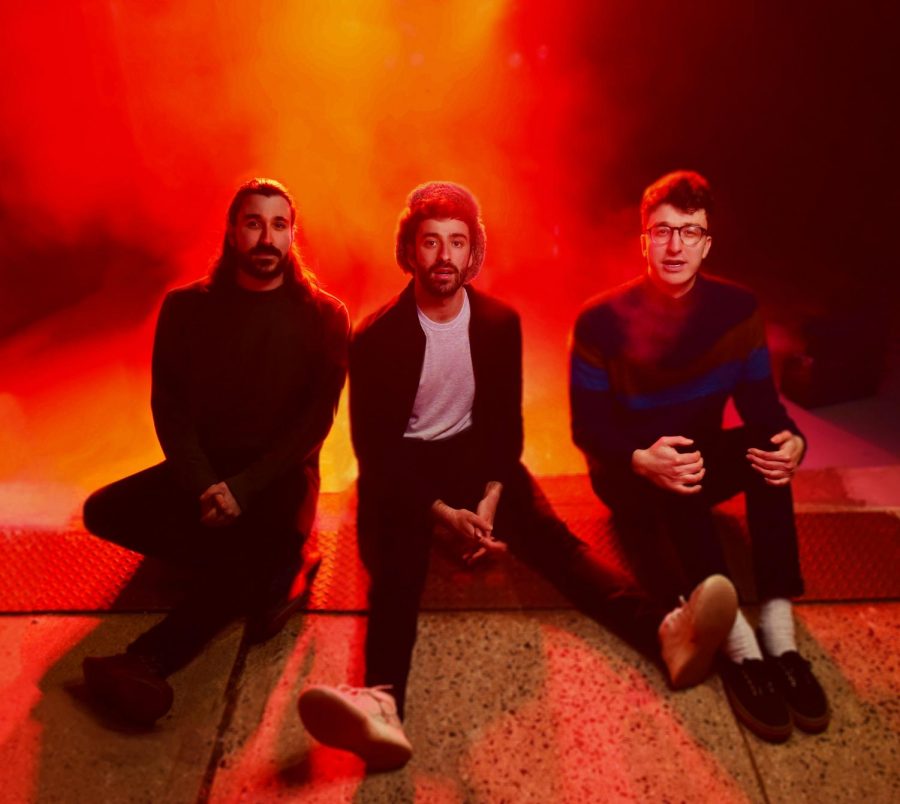AJR orchestrates a new alternative sound
AJR is an alternative, indie-pop band made up of brothers Adam, Jack and Ryan Metzger.
March 30, 2021
The curtain rises on a new era of the alternative music genre with the release of “OK Orchestra” by AJR. Their most lyrically and sonically diverse album yet, brothers Adam, Jack and Ryan Metzger open the world of alternative music to indie pop, doo-wop and electropop.
The intricacy of layering between horn riffs, oboe trills, guitar chords and automated audio lifts “OK Orchestra” a step above the band’s last album, “Neotheater.”
The first track on the album, “OK Overture,” gives listeners a peak into the creation process as it introduces a drum beat, vocals, reverb and guitar separately then allows the sounds to bleed together until the ultimate melody comes to fruition in a grand entrance as the bass line hits. The song itself isn’t something I would listen to past the two-minute mark, but as an overture is a single orchestral movement that introduces a more complex body of work, often including the main themes, this track achieves its purpose.
The next song is “Bummerland,” one of the single releases from the album, and arguably one of the best. Mixing orchestral drums with a synthesizer creates an ominous tone while a constant tambourine builds tension to the releases in the chorus. It seems to parallel the feeling everyone has of not being able to do anything during the pandemic, but in a way that is finally embracing the heaviness.
In it, Jack sings, “Bummerland, here I am, better nix my summer plans. Bummerland, give a cheer, ‘cause you’re only going up from here,” insinuating that as soon as we accept our circumstances, we can start moving up. The bridge of the song sets up the remainder of the album perfectly as a voice melts into a brassy trumpet tone that stutters out into a series of violin chords and drum-beats before the final chorus comes in.
Following “Bummerland” is “3 O’Clock Things,” which is reminiscent of a drunken 1940s swing party where the barkeep listens to the slurred drunk who goes on a free-form-style rant. Big horns and bright brassy tones combine to bring the song alive as Jack talks about preconceived notions about politics in entertainment, mental illness and the toxicity of media-influenced culture.
The next track takes the energy down a notch with “My Play,” a song about a child not wanting to repeat his childhood in two places because his parents are divorced. The musicality in this song is lighter as it almost creates a doughnut format to frame the lyrics for maximum impact. As someone who has divorced parents, I can say the hurt and anger in their voices are gut-wrenchingly relatable enough to not listen to it two times in a row.
Bringing the album back up to speed, an electric piano mix introduces “Joe,” a song with a childlike joy to it. The lyrics are about trying to finally gain the respect and pride of an idol that proves to be unattainable. This song, along with “The Trick,” “Ordinaryish People,” “Humpty Dumpty” and “World’s Smallest Violin,” seems like a prolonged therapy session for AJR that I wouldn’t necessarily want to sit in on. Sonically, though, the track undeniably matches each lyric perfectly.
“Adventure Is Out There” comes next on the album, providing a relief from the metaphorical brain bender the rest of the album is. With a Southern-style guitar twang and light chorus, this is the song you want to blast in your car riding cross country on a sunny day as Jack sings, “Holy moly, it’s a real do-nothing day. I could change my address and try another state.”
Next comes “Bang!” which you might recognize for its hard-hitting chorus. This could’ve been the festival song of the year had the pandemic not existed. It was released in February of 2020 before lockdown happened, but had it not, I would’ve requested this song at every party. Incorporating pieces of the orchestra often overlooked such as the metronome and baritone, this song brings in the abnormal and makes it the focal piece — something AJR is highly skilled at doing.
“The Trick” is about pretending to be something you’re not, a common theme seen in previous AJR songs like “Pretender.” The reverb and vocal compression on this song makes it an incredibly odd listening experience that I’m not sure is worth a place on the album. It feels discombobulated and unearthly, taking away from any lyrical meaning the song might hold.
The next song is “Ordinaryish People,” featuring the Blue Man Group. As a fan of the Blue Man Group, my biased opinion is that this song hits the nail on the head. It feels as though I’m listening to the masterpiece closure of a drum and bugle corps as ornate brass converses with the complex drum beats the Blue Man Group produces.
Other songs strike a similar level of eccentricity but aren’t as well-executed. One of these songs is “Humpty Dumpty,” the next song on the album. The song is about running away from problems that you know you shouldn’t. The singer relates Humpty Dumpty’s fall when no one is around to having massive depressive episodes and panic attacks behind closed doors. The song still holds a light tone, producing an even darker feeling by juxtaposition.
“World’s Smallest Violin” is a knee-slapping chant akin to using a washboard and stomping on the ground that Gaston might sing in “Beauty and the Beast.” The metaphor of the world’s smallest violin is to have success that is considered insignificant in comparison to the grander schemes of life and feeling extreme pressure to the point where you finally explode.
Second-to-last on the album is “Way Less Sad,” which in line with its name, has a more vibrant tone. It’s an attempt to stop the constantly spinning world and take a moment to feel OK. The trumpet is the centerpiece in this song, and like many of the other tracks on this album, it is noteworthy that the brothers are responsible for the instrumentation, vocals and programming. Many bands today don’t have a near-equivalent to the talent these brothers hold musically.
The curtains come to a close and the brothers come out for a final bow as “Christmas in June” plays. This song isn’t really Christmas music like you’d expect, and even features a clarinet in the beginning, yet it is the best way they could’ve finished the album. As AJR completes its fourth studio album and gains more notoriety, the situation of personal relationships enters the question. As anyone with an unwavering devotion to the success of their career knows, having a relationship often falls to the side. “Christmas in June” exhibits this internal scrimmage, with lyrics like, “How lucky am I to have two things I love?” and “One big show will make ‘em know my name, but if it ends up falling on our wedding day, oh God, don’t make me choose.” This song seems to pay homage to “Dear Winter,” a song from AJR’s last album that contemplates finding love in order to have a child and name him Winter.
“Christmas in June” ends on a bittersweet note as the music fades away and Jack sings, “Hold on love a little longer while I get the album done. And if I get to tour it wouldn’t that be fun? But that’s one less month with you… now I’m sitting thinking about what else I’ll miss. Darling if we’re ever gonna have a kid, don’t wanna miss it, can we just have him in June?” It doesn’t necessarily sound like the grand finale piece, but the lyrics highly contrast the entire album, leaving listeners questioning their whole lives, or at least the last 46 minutes of it, as an orchestral masterpiece should.
CHLOE FORBES






